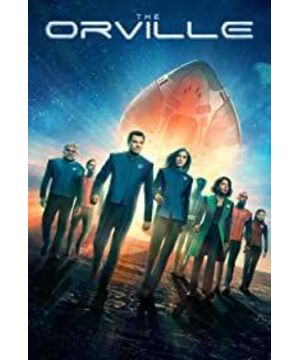There are two kinds of TV series that have always been considered good:
One is "breakthrough". Before it was born, no one knew that the original series could still be shot like this. For example, "Breaking Bad", which has become very popular in recent years.
The other is "conceptual". There are already pioneering works as a frame of reference. What it has to do is to follow the spiritual core of the predecessors, combine the advanced scientific and technological concept and the aesthetics of contemporary people, and carry out iterative upgrades.
Obviously "Star Trek" (1979) belongs to the former, and "The Orville" (2017) is advancing to the latter.
The "Star Trek" series uses the background of establishing peaceful cooperation between galaxies, placing human beings in various types of advanced intelligent life, and interpreting the possibility of different civilizations resonating at the same frequency. Even with significant intellectual and physical weakness, humans all occupy the leader's position in the alliance, carrying the responsibility of guarding and commanding.
The tone of anthropocentrism and the discussion of the coexistence of civilizations are seamlessly connected to the "Orville". The control of mankind was finally ridiculed by alien friends-too little strength, too fast metabolism.
The play also inherits the independence between the single episodes of the "Next Generation" series. Aesthetically, both adopt a bright Art Deco style. The metallic colors, smart home lines, and the use of new materials are all loaded with the pragmatism of future mankind.
The only difference may be the fine-tuning of scientific and technological terms: "Interstellar Federation" has become "Planetary Alliance", and "Metal Speed" has been changed to "Quantum Flight"...
It shouldn't be an exaggeration to describe the drama of this drama with low driving and high going. On the scoring website, Rotten Tomatoes, the reviews of the whole show are extremely polar, with film critics giving 19% of ultra-low freshness, while ordinary viewers giving 92% of ultra-high ratings. The reason may be that after watching the first episode, film critics left unfeeling bad reviews and impatiently chased them down.
To be honest, if it were not for the love of Seth, I would definitely take it after the dry plot and blunt performance of the first episode-the director's control and scheduling ability is too far. Like the villains of all second-rate sci-fi dramas, the big boss Quill of the whole show appeared on the stage in a strong posture, without sufficient motivation to pave the way, to carry out a deadly gunfight.
But every episode after the second episode of "General's Order" made me a pseudo-science fiction fan very enjoyable. Most importantly, after experiencing the chaotic warm-up of the first episode, Seth knew better what kind of drama he wanted to do, or how to better pay tribute to the classic in his heart.
At the same time, people who like "Teddy Bear" and "Spoof House" will not be disappointed. The whole show does not lack all kinds of amputations, dogs licking eggs, and cross-racial sexual hints. .
The helmsman Gordon and the intelligent robot Essek agreed to engage in a prank confrontation. As a result, Gordon's entire left leg was brutally amputated. Seth, the head of black humor who burying Jesus, Buddha, and various politicians on a daily basis, seems to be interpreting culture shock, but in fact once again demonstrates his comedic scale of evaporating the lower limit.
The time of the episode is set in the 25th century. Captain Ed from the Planetary Alliance was promoted to the captain of the exploration ship "Orville", and only discovered that he was pitted after he jumped into the post. His first officer was his ex-wife Kai, who parted ways a year ago because he was caught stealing a bag. Li. Well, this pair of mandarin ducks replaced the basic conflict between Captain Kirk and Spock. Whether they will reunite is one of the highlights of the relationship between the characters. It is similar to the "Friends" between Ross and Rachel. Line of affection.
The most similar thing about the whole series of "Star Trek: Second Generation" is its moral core.
When the captain and first mate were captured, the Alliance general ordered the security chief Alora (Strong Woman) to abandon the two, and the Orville returned to the Alliance Planet Alliance to wait for redistribution. Whether to obey the order of the organization or to respond to the friendship among the crew involves the contradiction between collective and personal interests, as well as the dilemma of absolutism and utilitarianism.
Similar ethical islands include:
Standing on the commanding heights of scientific and technological knowledge, the Kalifuns used violence to deprive other species of freedom and imprisoned them in the zoo for the inhabitants of this planet to visit. When the law of the jungle evolves to extreme conditions, is the "ethnocentrism" among highly intelligent beings reasonable?
The eco-ship ran aground after running out of energy, and the residents returned to the original world view. In order to establish authority, the leaders instilled religious beliefs in the churches and deposed the people's right to explore and question. How to interpret the practical significance of religion in the current era of rapid progress in scientific understanding of the world and oneself?
When the gender crisis comes to the single-racial star Botters and his same-sex partner, how to eliminate the gender crisis and secular stereotypes that have spanned thousands of years?
Theron plays a time traveler traveling through time and space through a wormhole, reselling the "old antiques" of the previous centuries. How to delineate the bottom line of business ethics in the context of new technology?
Through cross-examination of collective ethics and justice and the nature of religion, and then through debates and choices between roles, the creators also gave their own understanding and insights.
The essence of sci-fi fantasy across species is to create a practice field of moral law, simulating a kind of justice.
What surprises me most is that the universal value of political correctness is not necessarily the final manifestation in the play. Botters' daughter eventually underwent sexual reconstruction surgery. Ed's rescue of the children of Star Quill cannot reach a permanent racial reconciliation. The accumulation of reality is the ending closer to the truth. Racial discrimination and hatred are always the same as black holes that cannot be resolved, devouring all terrible existences.
View more about The Orville reviews











